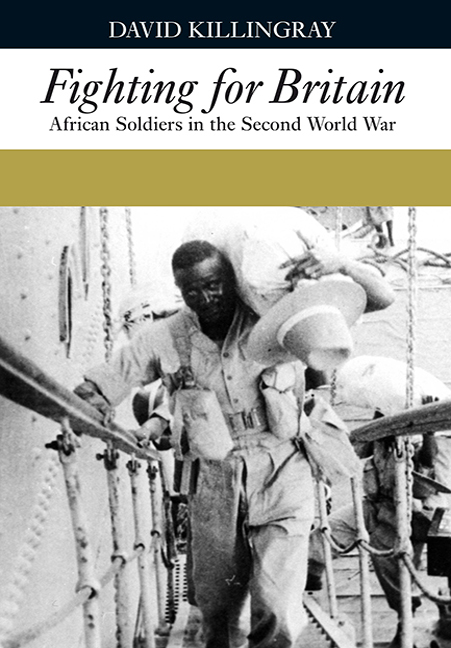Book contents
3 - Army Life
Published online by Cambridge University Press: 13 April 2017
Summary
It seems a good thing to have a war, bwana.
People are better fed, better clothed and better
paid than ever before.
For many young men the Second World War was a time of adventure and opportunity. Despite regimentation, occasional danger and much boredom, they could look back on their ‘good war’ as the most exciting time in their lives. They left home and familiar surroundings, met different people, travelled to other countries, saw new sights, and underwent a range of novel experiences. This was true for many Africans who enlisted in the British colonial armies, and who entered a life very different from their civilian one. Men who had never worn boots or eaten with utensils, had never seen a tarmac road or a motor vehicle, let alone the sea, or had never travelled aboard a vast ship, were thrust from the bush via the barracks into a startling new world. However, the ‘good war’ is a reflection for fortunate survivors. The dead lacked a voice and those whose lives were shattered had bitter regrets; for example, a wounded Tswana sergeant wrote from a hospital in the Middle East in 1945: ‘I never get sleep out of the pains from my knees. I now feel that I am a cripple who will not do anything in life.’
Initial training
For African recruits the first encounter with army life was invariably being taken, sometimes by lorry, to an assembly point or camp. There men were formally enlisted by a recruiting officer, often with the help of an African NCO who acted as interpreter. An attestation form was completed detailing the soldier's name, ethnic origin, home, next of kin, physical appearance, weight and height. Literate men signed the form, nonliterates provided a thumbprint. Recruits swore an oath of loyalty. In West Africa this involved ‘pagans’ licking a bayonet and saying, usually in Hausa: ‘If I should break this oath, may this bayonet devour me’, while Muslims and Christians swore on the Qur'an or the Bible. Soldiers were given a uniform; in the KAR this consisted of a light khaki tunic and “long shorts” (to keep out thorns), a khaki slouch hat, with the battalion number on it in Arabic numerals, and boots, the latter just introduced and worn unwillingly on the parade ground only. Heads were closely shaved against lice.
- Type
- Chapter
- Information
- Fighting for BritainAfrican Soldiers in the Second World War, pp. 82 - 120Publisher: Boydell & BrewerPrint publication year: 2010



